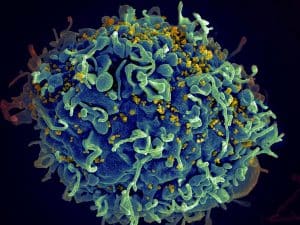-
Professor Ruth Ruprecht, M.D., Ph.D. Funding to prepare Mymetics’ cold chain-independent needle-free mucosal virosome HIV vaccine candidate for clinical trials
- Total award USD 8.67 million over 5 years, with USD 1.9 million budget in the first year
Mymetics Corporation (OTCQB: MYMX), a pioneer and leader in the research and development of virosome-based vaccines against life threatening and life disabling diseases, announced today that the National Institutes of Health (NIH) has awarded Mymetics and Texas Biomedical Research Institute (Texas Biomed) a five-year grant for the project called “Cold Chain-independent, Needle-free Mucosal Virosomal Vaccine to Prevent HIV-1 Acquisition at Mucosal Levels”.
The project has the objective to prepare Mymetics’ promising HIV-1 vaccine candidate for clinical trials. The vaccine candidate is based upon Mymetics’ virosomes, enveloped virus-like particles that display on their surface rationally designed HIV-1 antigens. The vaccine is created to induce protective mucosal antibodies acting a as frontline defense against sexual HIV transmission. An earlier formulation of the vaccine candidate has shown safety and immunogenicity in a Phase I clinical trial in healthy women. Two independent non-human primate studies demonstrated the safety and high efficacy of the virosome-based vaccine in Chinese and Indian-origin rhesus macaques against repeated low-dose intravaginal challenges with a monkey AIDS virus, a so-called tier 2 R5 SHIV that shares key biological features with transmitted forms of HIV-1. Mymetics recently finished a European Horizon 2020 funded project, where Mymetics developed adjuvanted new solid powder forms of the vaccine, which can be directly administered to mucosal tissues (nose, sublingual or oral) without needles and that do not depend on refrigeration, which makes the new vaccine attractive for the developing world where AIDS is at epidemic levels.

Courtesy: NIH Image Gallery
“We are excited to collaborate with Mymetics and our partners on a promising AIDS vaccine candidate that seeks to induce protective immune defenses at mucosal barriers – where HIV-1 first enters the body during sexual transmission of HIV-1. The new joint project complements our basic research, where we demonstrated potent protection with mucosal antibodies administered to rhesus macaques” said Professor and Director of the Texas Biomed AIDS Program, Dr. Ruth Ruprecht, who serves as Principal Investigator together with Dr. Sylvain Fleury, CSO of Mymetics Corporation.
“We are extremely grateful for the trust and support from the NIH for our project, it will enable the continued progress of our cold chain, independent virosome based HIV vaccine candidate” Ronald Kempers, CEO of Mymetics, stated. “We will be able to prepare it for clinical trials in collaboration with world leading HIV scientists from the University of Louisiana at Lafayette and our longstanding partner Texas Biomed.
The project will start on May 1, 2019 and is planned for five years. It is co-led by Drs. Ruprecht and Fleury and includes subawards to Dr. François Villinger of the University of Louisiana at Lafayette, and Dr. Sarah Ratcliffe of the University of Virginia. First results are expected to be reported in 2020.
About Mymetics
Mymetics Corporation (OTCQB:MYMX) is a Swiss based biotechnology company, with a research lab in the Netherlands, focused on the development of next-generation preventative vaccines for infectious and life disabling diseases. It currently has several vaccines in its pipeline: HIV-1/AIDS, intra-nasal Influenza, malaria, Chikungunya and the RSV vaccine in addition to several ongoing collaborative projects in the field of allergy and oncology Immunotherapy.
Mymetics’ core technology and expertise are in the use of virosomes, lipid-based carriers containing functional fusion viral proteins and natural membrane proteins, in combination with rationally designed antigen and adjuvants. For further information, please visit www.mymetics.com.
About Texas Biomed
Texas Biomedical Research Institute is one of the world’s leading independent biomedical research institutions dedicated to advancing health worldwide through innovative biomedical research. Located on a 200-acre campus on the northwest side of San Antonio, Texas, the Institute partners with hundreds of researchers and institutions around the world to develop vaccines and therapeutics against viral pathogens causing AIDS, hepatitis, herpes, hemorrhagic fevers, and parasitic diseases responsible for malaria, schistosomiasis and Chagas disease. The Institute also has programs in the genetics of cardiovascular disease, diabetes, obesity, psychiatric disorders and other diseases. For more information on Texas Biomed, go to www.TxBiomed.org.
About NIH and NIAID
This research is being supported by the National Institute of Allergy and Infectious Diseases of the National Institutes of Health under Award Number U19AI142636. The content is solely the responsibility of the authors and does not necessarily represent the official views of the National Institutes of Health.
